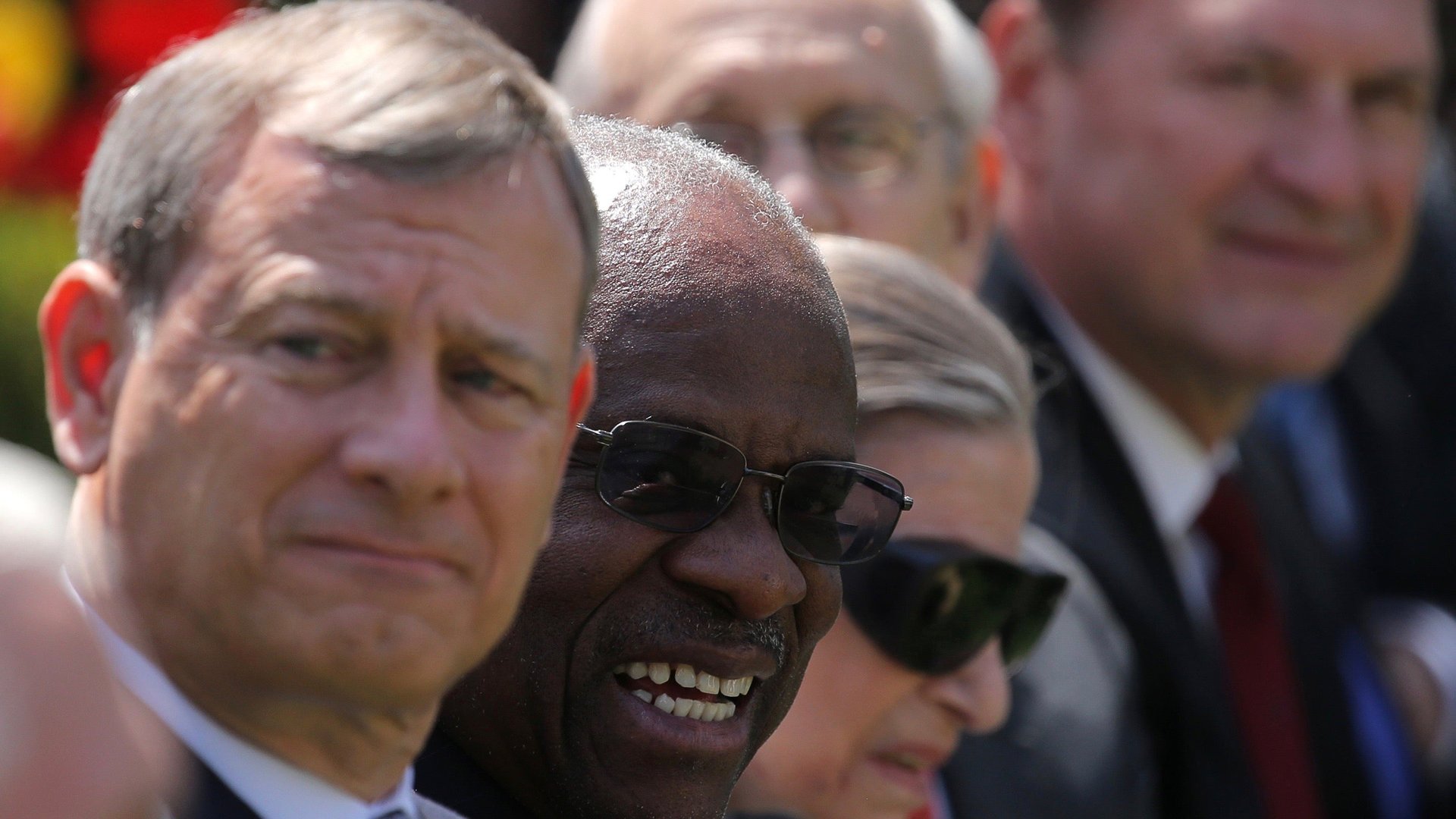The historic shift in the US Supreme Court’s religious makeup (plus or minus a Gorsuch)
US Supreme Court justices are secular clerics of the highest order. The Constitution is their guiding document—a set of basic commandments—and textual analysis is their practice, used to dissect thorny moral issues. All share a reverence for the law: It would be impossible to get the gig without a religious devotion to its rule.


US Supreme Court justices are secular clerics of the highest order. The Constitution is their guiding document—a set of basic commandments—and textual analysis is their practice, used to dissect thorny moral issues. All share a reverence for the law: It would be impossible to get the gig without a religious devotion to its rule.
Still, a shift in the religious backgrounds of justices in recent years arguably represents a dramatic change in American culture. There is no religious test for Supreme Court justices, nor any requirement that the bench represent the makeup of the nation. Yet it’s notable that court has gone from all-Protestant origins to now mostly-Catholic, with one third of the bench Jewish.
This may indicate the great rise of the latter two minority faiths overcoming discrimination, as noted by the Huffington Post in 2014. It may also be indicative of a takeover of the nation’s most powerful institutions by liberal elites—or the fact that Judaism and Catholicism have a long tradition of legal reasoning, unlike Protestantism, as Christianity Today said in 2010.
Since the court’s inception in 1789, there have been 91 Protestant judges named out of 113 total justices. When the high court was established, justices were chosen from the ranks of the Founding Fathers, who were overwhelmingly Protestant. Of these, 33 have been Episcopalian.
In recent decades, the tables have turned completely. Currently, there are five Catholics, three Jews, and one unknown on the bench. The Catholics are chief justice John Roberts, and justices Anthony Kennedy, Clarence Thomas, Samuel Alito, and Sonia Sotomayor. The Jewish justices are Ruth Bader Ginsberg, Stephen Breyer, and Elena Kagan. The latest to join the high court, Neil Gorsuch, is possibly a Protestant—specifically Episcopalian. But he hasn’t actually specified his faith.
Gorsuch is known for judicial decisions that protect religious freedom for Christians, Muslims, and Native Americans. He is considered by some as a nod by Donald Trump to Christian evangelicals, yet Gorsuch is not known to be one himself.
In fact, his faith is something of a gray area. During his Senate confirmation hearings, he said his father showed him “that there are few places closer to God than walking in the wilderness or wading a trout stream.” Gorsuch was raised Catholic, attended a progressive Denver Episcopalian church, and has been described by friends and family as having “a quiet faith.”
Episcopalianism is a branch of Protestant Christianity derived from the Church of England, which was itself created in the 1530s when King Henry VIII split from the Pope to obtain an annulment of his marriage to Catherine of Aragon, who bore him a daughter. The king sought a male heir, and so a new religion was born that’s now practiced around the world.
The Episcopal Church calls itself “Protestant, yet Catholic.” In other words, it’s a kind of new Catholicism informed by Martin Luther’s reformation. According to 2014 Pew Research, about 1.3% of Americans identify as Anglicans or Episcopalians. That’s a tiny minority of the 45% who identify as Protestants, and of the 70% who count themselves Christian.
For the first 180 years of the Supreme Court, Protestant justices were overwhelmingly dominant, Catholics were few—the first was appointed in 1836—and there were no Jews until 1916. It’s notable that the only chief justice with a Catholic background is Roberts, showing how recent this shift has been.
But of course, the about-face on faith also raises questions about whether Americans have swung too far in one direction. With Gorsuch’s faith deliberately undefined, as it seems to be, it’s not clear that are any Protestants on the high court today. Religious beliefs are not supposed to be an influence on US judicial decisions, and arguably haven’t been over the years, according to legal scholars. Justices have not been found to vote in blocks based on their religions thus far.
Still, the preoccupations of the law and of faith are similar, and so the faiths of the justices are of interest to many and seem somehow telling. There have never been any Muslims, Buddhists, or Sikhs appointed to the high court, for example, nor has any justice ever been an avowed atheist, though increasingly Americans identify with these positions. Perhaps it’s just a question of time.